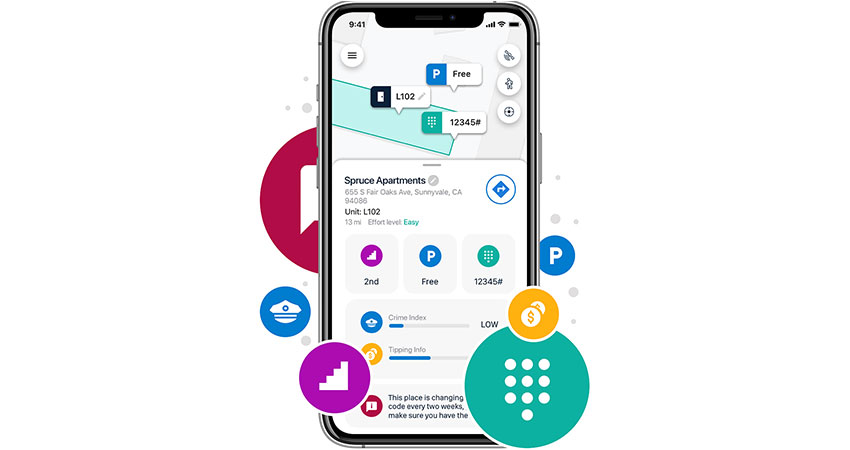Beans.ai, a routing optimization provider that enables FedEx Ground and others to direct drivers to exact locations like apartment units, and provides other details like parking locations and delivery rules, has come out of stealth mode with a $17 million investment.
Begun by veterans of Google, Uber and Yahoo, Beans.ai raised the funding from Saama Capital and Google veteran Amit Singhal, with participation from Venture Highway, Mubadala Capital and industry veterans Brian McClendon and Manik Gupta, among others. The founders say they have mapped 65% of the continental U.S. in the past three years, and plan to have it completely mapped within six months as the process has been optimized.
“Navigating the last mile of delivery is an incredibly complex problem to solve,” said McClendon, CEO and co-founder of CVKey Project and formerly a VP at Google, where he built Google Earth, Google Maps and similar applications, in a release. “By combining data collected from ground ops with machine learning algorithms, the Beans.ai team have introduced efficiency into logistics solutions that were previously unattainable.”
The company’s offerings include Beans Maps+, with hyper-accurate location information for apartments, condos, hospitals, and universities, along with access codes, parking locations, etc.; Beans Route, which simplifies dispatch and driver schedule management; and Beans Optimize, a dynamic route planning engine.
For a high-tech platform, Beans.ai uses good old fashion legwork to gather mapping data. Maps are collected by gig drivers who go into leasing offices, emergency responders and other campuses, and are paid $8-$10 for each one. They are digitized using a combination of machine learning and a labeling team in India.
Beans.ai not only lets drivers know the exact location of an address or unit, but also provides invaluable information like where they can park to avoid getting ticketed, and which buildings have pickup lockers or where they have to show an ID to a doorman or concierge.
“This has not existed in the U.S. until now,” said co-founder and CEO Nitin Gupta, who led the group that developed tools for third-party integration into Google Home and Google Assistant. “There are no regulations that you have to submit data to the city on unit location. You submit the blueprints, but not unit number mapping, or the naming or numbering convention.”
Gupta said the company waited to launch until now because it made no sense to announce with just 15% or 20% of the locations mapped, and they wanted to prevent others from swooping in and copying their idea.
“We’ve built a good moat of technology and data science, a critical mass that allows us to succeed,” said his co-founder and chief business officer, Akash Agarwal, a friend since college days in India who came to Beans.ai by way of Verizon and Yahoo. The company has 21 U.S. employees and about 60 in India.
The funding comes as the company has facilitated more than 200 million total deliveries so far in 2021, while also providing services for emergency personnel from fire departments and EMS. In addition to FedEx Ground, Beans.ai powers route optimization for Uber Eats and west coast regional carrier OnTrac.
Gupta said the genesis of Beans.ai was a medical emergency with his mother, visiting from India in 2018, leading to a 911 call from his apartment in Palo Alto, CA. He said it took the paramedics five minutes to reach his building, but another 15 to find his unit.
“It was surprising to me you can get pizza at your door faster than paramedics, and I knew something was fundamentally wrong that needs fixing,” Gupta said. “We needed to solve this problem.”
Using Beans.ai’s micro-mapping solution, the company claims, drivers can make on average 20% more deliveries per hour, companies experience 15% less driver churn and drivers report 70% higher rates of job satisfaction.
Also, time is money in the expensive last mile; and don’t forget, a late delivery cost Peter Parker his pizza delivery job. Gupta said in California, for example, every minute a delivery driver is delayed costs the company 30 cents. “Customers are upset, calling to ask where is the driver,” he said. “Everyone is unhappy with the logistics of the system, and emergency departments more so because it’s life or death.”
“The tool can do this at 5-10x the speed of what you do on paper,” Gupta said. “We studied apartment complexes and high-density areas, which accelerates the drawing of maps. In many ZIP codes, buildings usually follow certain numbering patterns. In a few clicks, we can create a map based on prior knowledge of building size, shape and design.”
With the funding, Beans.ai will be able to speed up and complete mapping of the U.S., and is looking to expand internationally, starting with the UK, Germany and Japan. It is currently available in Canada as well.
“We have interest from different postal authorities around the world, and most of our clients have an international presence,” Gupta said.

